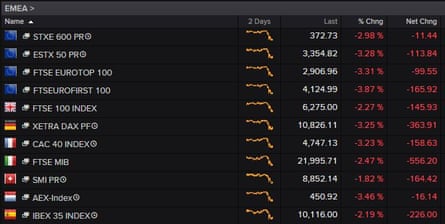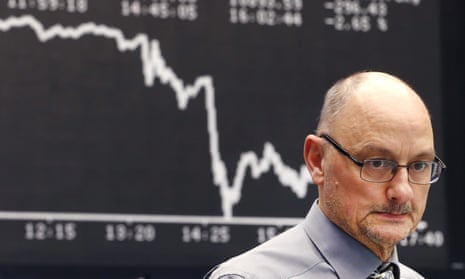Eurozone markets have plunged after the European Central Bank president dashed investors’ hopes of aggressive new measures to boost the flagging economy.
Mario Draghi had sent strong signals in recent weeks that he and his colleagues on the ECB’s governing council were prepared to “do what we must to raise inflation as quickly as possible”, and news that inflation remained at just 0.1% in November had intensified expectations of decisive action.
In the event, Draghi announced a modest reduction in the deposit rate paid on reserves held at the central bank – which is already negative but falls further from -0.2% to -0.3% – and a six-month extension of the end-date for the ECB’s €60bn-a-month quantitative easing (QE) programme.
At his press conference, Draghi said the measures would “reinforce the momentum of the euro area recovery, and strengthen its resilience against recent global economic shocks”.
But markets, which have become reliant on the flood of cheap cash pouring from the world’s central banks, deemed the announcement to be a disappointment.
As Draghi spoke at a press conference in Frankfurt after the decision, the euro surged on foreign exchanges – the reverse of the impact policymakers hope for from QE. The euro gained two and a half cents against the dollar, jumping from below $1.06 to above $1.08: the largest one day move since March.

Shares fell sharply, with the French Cac and German Dax indices closing down more than 3.5%. In London, the FTSE 100 lost 2.2% of its value.
Jonathan Loynes, chief European economist at consultancy Capital Economics, said: “The ECB has comprehensively failed to live up to its own hype and markets and forecasters will take future communications from Mr Draghi and colleagues with a corresponding bucket of salt.”
Analysts suggested the more sceptical members of the ECB’s governing council, such as the Bundesbank president, Jens Weidmann, may have blocked more aggressive action.
Draghi acknowledged the decisions at the council meeting had not been unanimous, but had been passed by a “very large majority”. “We are doing more because it works: we want to consolidate something that’s been a success. This cut in the deposit rate, we think it’s adequate,” he said.
The lower deposit rate means banks, which in effect already have to pay the ECB for holding their cash, will have to pay more, in an attempt to keep money flowing around the eurozone economy, instead of parked at the central bank.
The euro spiked on foreign exchanges in the moments before the announcement, when the Financial Times accidentally published a story wrongly suggesting the ECB had left interest rates unchanged.
The FT subsequently removed the story from its website and issued an apology, saying: “Please ignore earlier tweet headlined ‘ECB leaves rates unchanged in shock decision’. This was published in error.”
The ECB said it would leave its other interest rates unchanged, including the key refinancing rate, which ripples out to borrowers across the economy. This rate has already been slashed to just 0.05%.
Draghi said cheaper oil was underpinning the economy by boosting consumer demand, but he pointed to the risks to growth from global shocks such as the Chinese downturn. “The risks to the euro area growth outlook relate in particular to the heightened uncertainties regarding developments in the global economy as well as to broader geopolitical risks,” he said.
As he spoke, the Greek authorities were wrestling with a new general strike in the recession-scarred country. The Syriza government in Athens has faced repeated protests over the austerity measures it has been forced to take as a result of the bailout deal struck with its eurozone creditors.
Some analysts said the markets’ disappointment with the ECB’s actions on Thursday might eventually fade. David Owen, of consultancy Jefferies, said the announcement that QE would continue until at least March 2017 suggested Draghi and his colleagues were determined to keep boosting the eurozone economy, even if the US Federal Reserve pushed up interest rates this month as expected.
He also stressed other elements of the announcement, including news that the ECB would include regional and local government debts in its bond-buying programme and would reinvest the repayments it received on the bonds it already owns to keep policy stimulative. “Rather than ‘shocking and awing’ the markets, the ECB signalled it is prepared to play the long game,” Owen said.

Comments (…)
Sign in or create your Guardian account to join the discussion